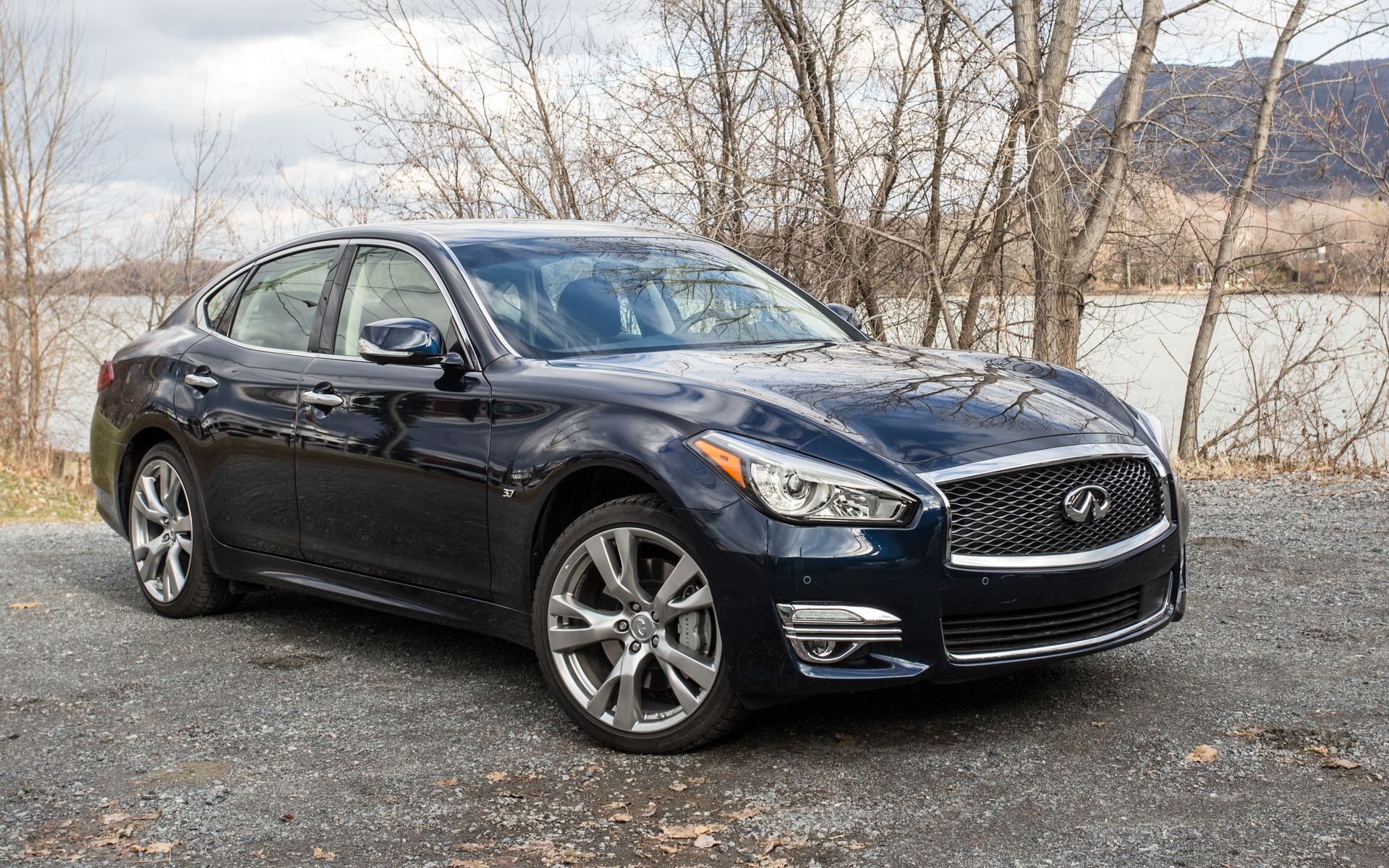The 2015 Infiniti Q70: Overshadowed Luxury


Infiniti’s standard-bearer is the Q70, charged with penetrating the full-size luxury sedan market. It has a tough assignment in trying to steal market share from the BMW 5 Series, the Mercedes E Class and Audi’s A6. These three are not easy opponents, but Infiniti claims to be focused rather more on Lexus GS and Cadillac CTS buyers. In a segment where brand prestige is very important, the Q70 has an even tougher row to hoe.
To offset its lack of pedigree, the Q70 – a sedan formerly known as the M – offers sporting lines, quality assembly and solid reliability. While the 2015 edition is not a full makeover, it can boast a revised exterior, a few technical modifications and a new long-wheelbase (LWB) version: the Q70L. This mid-cycle refresh will help it remain competitive until the next generation makes its bow.
Three familiar power units
Under the hood, little has changed in recent years. The base Q70 inherits a 3.7-litre V6 that still lacks direct injection, but definitely gets your attention with its 330 hp. It endows the Q70 with sporting performance, without being overwhelming. Its fuel economy is a definite asset. All Q70s except the hybrid come with all-wheel drive (AWD) as standard equipment, which was not previously the case, and a 7 speed automatic transmission.
If you want more muscle, the 5.6-litre V8 is still listed, but is available only with the LWB version. It develops 420 hp and 417 lb-ft of torque, figures that put it on a par with the heavy hitters in its segment. Its fuel consumption is naturally what you would expect of a V8: high. The hybrid configuration gives better fuel economy, but the price differential is over $8,000 which, in a world of falling gas prices, is even harder to justify. It really requires an act of faith!
Sophisticated style
Styling changes reflect those made to its smaller sister, the Q50. The Q70 has the new Infiniti family likeness, with a sculptured grille and more aggressive looking headlights, now with LED accents. The sporting nature of the big sedan is emphasized by bulging fenders and a downward-raked hood that provide the model’s visual signature. Additional bright work, dual exhausts and sporty wheels adorn a successful shape that yields little to its rivals in terms of character.
While the exterior has acquired a new look, the same cannot be said of the interior. The cabin of the Q70 has stayed largely unchanged for a number of years, but while it is beginning to show its age, there is no cause for concern just yet. Once again, we find the traditional arrangement of the various elements, particularly in the centre stack, which groups controls on two levels, like a piano. It is less than ultramodern, but at least it is much easier to use than some modern multifunction control systems. In general, the interior is well put together and notable for the richness of its leather and wood trim. Topstitching here and there helps to reinforce the impression of richness within. In terms of standard equipment, Infiniti offers more than the German automakers do, and buyers are not forced to pick from a list of high-priced options. This is one of the real advantages enjoyed by the Q70. The top prize, however, goes to the Koreans – the Kia K900 and Hyundai Equus – which are pushing the envelope in this area.
On the road
On the road, the car is pleasingly quiet and comfortable. That statement is even more true this year, because the engineers have improved the acoustics by adding sound-deadening material and quieting road noise. The 3.7-litre 6-cylinder is one of the most satisfying power units on the market, and in the Q70, it offers ample power and torque for spirited driving. The engine provides power to all four wheels through an excellent 7-speed automatic transmission, which also contributes to fuel economy.
If you appreciate the firm suspension and accurate steering typical of German products, you should know that this is not what the Q70 is about. Infiniti prefers to emphasize comfort, as its closest rivals do. Driving characteristics can be personalized using the mode selector, but the system is much less comprehensive than what the competition offers: the Normal, Sport, Eco and Snow modes adjust throttle response and transmission settings, but do not affect steering or suspension.
In Eco mode, you can experience the “Eco Pedal”, which cools your ardour by stiffening the accelerator, but it has to be said that this quickly becomes an irritant, and many people will decide to just leave the selector in Sport mode, where it seems to work best.
It is no easy task to carve out a niche in the luxury sedan market. The Q70 nevertheless exerts a certain charm with its successful styling and a driving experience that is less exciting than that offered by a 5 Series BMW, but much more exciting than what you get in a Hyundai Equus.








